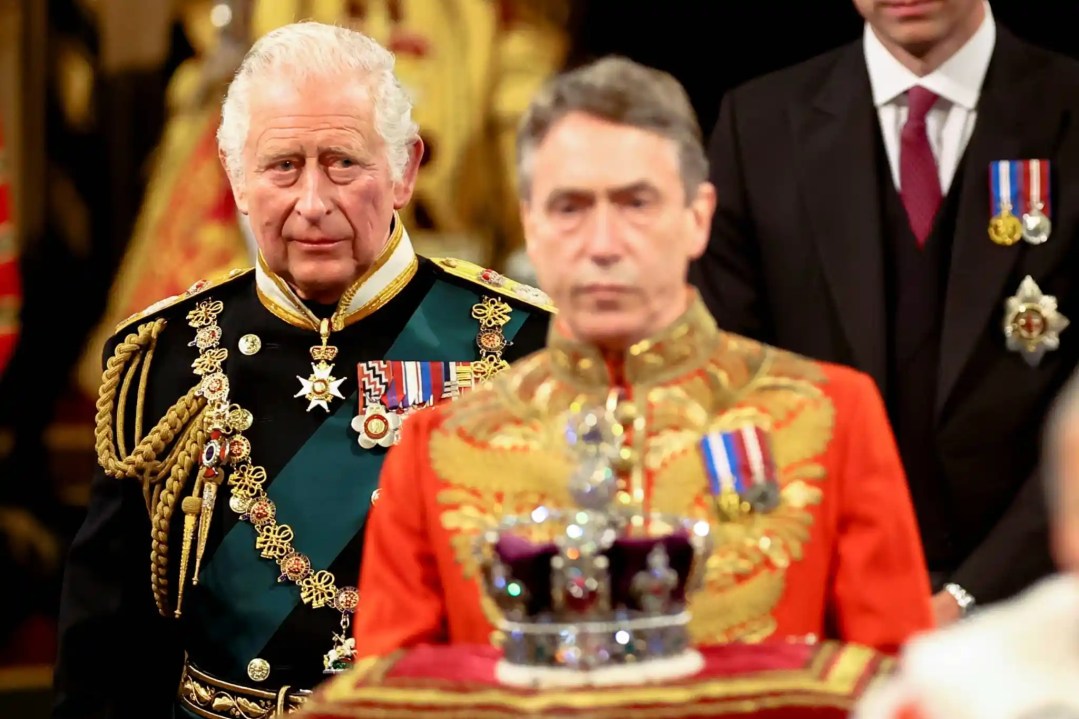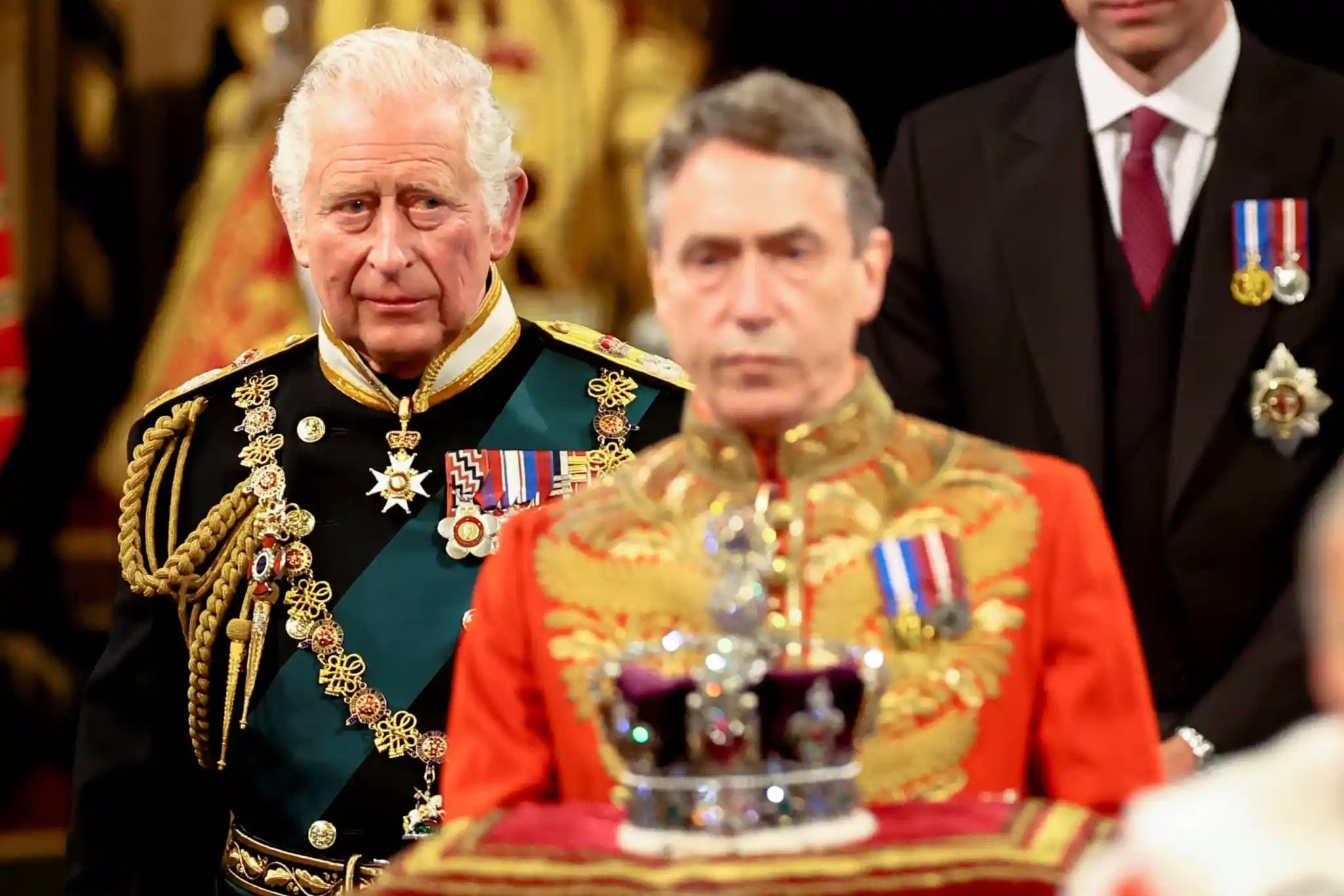King Charles has just finished taking part in the state opening of parliament for the first time as monarch. The purpose of today’s King’s Speech was to set out the government’s priorities for the coming parliamentary session, which will be the final one before the next general election. This was Sunak’s chance to draw political dividing lines with Labour, but there were few surprises. It was the longest statement read out by a monarch since 2005 but contained the fewest bills since 2014.
Below is a rundown of the 21 planned bills announced today.
Criminal Justice Bill
This bill will force criminals to attend their sentencing hearings, following the Lucy Letby case. Police will be permitted to enter a premises without a warrant to seize stolen goods where they have ‘reasonable proof’ they are in the property. They will also be given powers to tackle ‘persistent, nuisance and organised begging’ under legislation to replace the repealed Vagrancy Act.
Sentencing Bill
Jail sentences of less than a year will be scrapped for most criminals by creating a legal presumption that they should instead receive suspended prison terms and be required to do unpaid work in the community such as cleaning streets or scrubbing graffiti off walls. Those serving sentences over four years will also for the first time be eligible to be released early on tags.
This liberalisation of sentencing guidelines for ‘minor’ crimes is accompanied by new restrictions on others. Sadistic or sexual killers will face whole life terms so that ‘life means life’ while convicted rapists will now have to spend their entire sentence in prison rather than be eligible for parole at the halfway point.
Tobacco and Vapes Bill
This legislation is needed to enact Rishi Sunak’s plan to introduce a generational smoking ban by phasing out all legal tobacco sales in England. Under the proposed ban, anyone who was born on or after January 1, 2009 will never be allowed to buy cigarettes. MPs have already been promised a free vote on the ban. It will face resistance from parts of the Tory party – Liz Truss has already signalled she will vote against it. However, given Labour will likely back it, the government should win comfortably when the vote comes next year.
Ministers are also going to explore the introduction of a new tax on vapes, similar to tobacco duty, to curb their growing use, especially among those underage. There are plans to ban the sale of child friendly flavours and packaging and make sure vapes are kept behind the counter.
Investigatory Powers (Amendment) Bill
The legislation will force technology firms to inform the Home Office prior to installing new privacy and security features and enable the government to disable them. It will also increase the government’s power to make foreign firms comply. The intelligence agencies will be able to ‘more effectively’ study less sensitive bulk personal data which is already widely available to the public.
Football Governance Bill
Sixty-four professional clubs have entered administration as a result of financial gambles and poor governance since 1990, with two-fifths located in the north of England. A football regulator and licensing system will be introduced to stop this, covering the clubs in the top five tiers of England and Wales. The new system will set a standard of fan engagement as part of the licensing regime, with enhanced scrutiny of owners and their finances. It will also prevent clubs from joining breakaway leagues like the short-lived European Super League project in 2021. New rules will mean clubs have to secure more than 50 per cent of fan support before changing their badge, name or home shirt colours.
Leasehold and Freehold Bill
All new houses, though not new flats, in England and Wales will be sold as freehold properties. This bill will reform leasehold rather than scrap the existing system entirely, with ground rents for new and existing properties capped and the default length of leases set at 990 years rather than 99 years. New rules will be introduced to allow flat owners to more easily buy their freehold. This controversial change has been delayed for years, dating back to Theresa May’s time in Downing Street. Some Tory MPs want to amend it to include new flats, with Labour now seeking to outstrip the Conservatives.
Offshore Petroleum Licensing Bill
Tory strategists hope to use this King’s Speech to lay some traps for their Labour opponents and there are few better examples than this piece of legislation. This bill has been drawn up ostensibly to ensure a continued supply of annual North Sea oil and gas licensing rounds. However it also offers a tricky conundrum for Sir Keir Starmer, who has ruled out granting any new licenses. The new bill will also allow companies to bid yearly for new licences to drill for fossil fuels in the North Sea.
Automated Vehicles Bill
This legislation aims to pave the way for driverless cars on Britain’s roads, via a new legal framework. Ministers hope autonomous vehicle companies will operating commercial services to the public within the next six years. Firms will be held fully accountable for mistakes, with fines and possible criminal charges. People sat behind the wheel when a car is driving itself will be given immunity from prosecution.
Media Bill
The bill will scrap the controversial post-Leveson law that meant newspapers were liable to pay the legal costs for both sides in libel and privacy cases, regardless of who won. Labour’s position on this will be watched closely, ahead of newspapers making their election endorsements. There will also be a stricter regulatory regime for streaming platforms like Netflix and moves to address the regulatory burdens for commercial radio.
Pedicab Bill (London)
This bill aims to empower local authorities to ban nuisance or unscrupulous pedicab drivers in cities like London. Transport for London will be given powers to enforce new rule to prevent tourists being ripped off. Pedicab drivers will also have to undergo criminal record and right to work checks before they are allowed to carry passengers, like taxi drivers do.
Digital Markets, Competition and Consumers Bill
This piece of legislation aims to enhance consumers rights and protections in the online sphere. It will target drip pricing, where firms such as airlines only advertise part of a product’s price upfront and reveal other changes later in the buying process. The bill will also clamp down on fake online reviews and give people new rights to exit subscription contracts.
Data Protection and Digital Information Bill
This will reform data rights and strengthen the powers of the Information Commissioner’s Office to help tackle nuisance callers. King Charles said there will furthermore be new post-Brexit legal frameworks to ‘encourage innovation in technologies such as machine learning’. Rules around using personal data for scientific research will be clarified and a less onerous form of the EU’s GDPR will be developed.
Renters (Reform) Bill
The Bill had its second reading last month and heralds a huge shake-up of the sector after it was first announced in 2019 and introduced in May. The government confirmed recently that it will not bring in its controversial ban on Section 21 evictions until problems with the courts have been fixed. The legislation will also outlaw blanket bans on tenants having pets, though property owners will be able to require them to take out damage insurance.
Holocaust Memorial Bill
This legislation is necessary to allow for the building of a Holocaust memorial and learning centre in Victoria tower gardens near the Houses of Parliament. It fulfils a manifesto commitment to build such a facility to ‘act as an inspiration to the whole nation for generations to come.’
Economic Activities of Public Bodies (Overseas Matters) Bill
This bill will prevent public bodies and councils from campaigning against, sanctioning, or boycotting a foreign territory and is aimed at curtailing the activities of the so-called ‘BDS Israel’ movement. It will include enforcement powers that will allow for compliance notices and impose cash penalties on public bodies that breach the ban.
Victims and Prisoners Bill
This will put the Victim’s Code on a statutory footing, to state minimum levels of service for victims of crime. Ministers will get powers to block the release of a new ‘top tier’ of prisoners convicted of murder, rape, the most serious terrorism offences, or causing or allowing the death of a child.
Prisoners convicted of the most serious offences or serving whole life terms will be barred from marrying in jail, while there will be an automatic suspension of parental responsibility from a person convicted of murder or voluntary manslaughter of their partner.
Trade Bill
This Bill allows Britain to join the Comprehensive and Progressive Agreement for Trans-Pacific Partnership (CPTPP) with Australia, Canada, Japan and others.
Arbitration Bill
This uncontroversial piece of legislation is based on recommendations from the Law Commission of England and Wales. More families and businesses will be able to take advantage of arbitration rather than having to go to court to resolve disputes.
Terrorism (Protection of Premises) Bill
This bill was drawn up in the wake of the Manchester Arena terror attack. Venues will now be required to fulfil ‘necessary but proportionate’ steps to mitigate the impact of a terrorist offence and reduce harm through both physical measures and support, guidance and training for staff at venues.
Animal Welfare (Livestock Exports) Bill
This aims to ensure that animals are slaughtered domestically in ‘high welfare’ British slaughterhouses rather than be taken on excessively long journeys prior to slaughter.
Draft Rail Reform Bill
A new body, Great British Railways, will oversee the delivery of services and ticket prices. This legislation aims to cut the cost of a single ticket. Under the current system, train companies often charge almost the same price for a single journey as they do for a return.








Comments